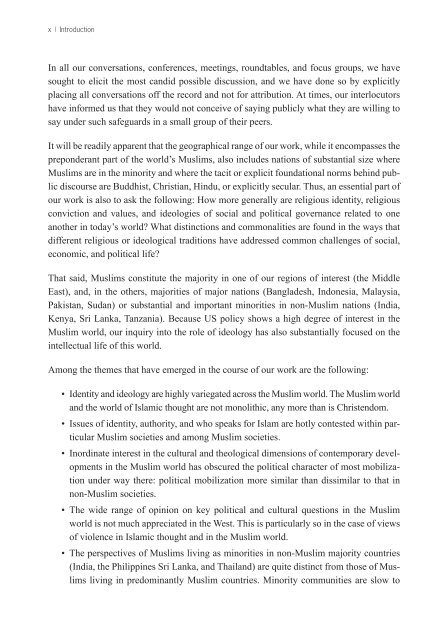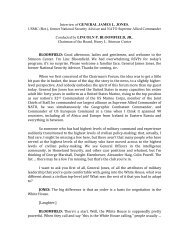Islam and Politics - The Stimson Center
Islam and Politics - The Stimson Center
Islam and Politics - The Stimson Center
Create successful ePaper yourself
Turn your PDF publications into a flip-book with our unique Google optimized e-Paper software.
x | Introduction<br />
In all our conversations, conferences, meetings, roundtables, <strong>and</strong> focus groups, we have<br />
sought to elicit the most c<strong>and</strong>id possible discussion, <strong>and</strong> we have done so by explicitly<br />
placing all conversations off the record <strong>and</strong> not for attribution. At times, our interlocutors<br />
have informed us that they would not conceive of saying publicly what they are willing to<br />
say under such safeguards in a small group of their peers.<br />
It will be readily apparent that the geographical range of our work, while it encompasses the<br />
preponderant part of the world’s Muslims, also includes nations of substantial size where<br />
Muslims are in the minority <strong>and</strong> where the tacit or explicit foundational norms behind public<br />
discourse are Buddhist, Christian, Hindu, or explicitly secular. Thus, an essential part of<br />
our work is also to ask the following: How more generally are religious identity, religious<br />
conviction <strong>and</strong> values, <strong>and</strong> ideologies of social <strong>and</strong> political governance related to one<br />
another in today’s world? What distinctions <strong>and</strong> commonalities are found in the ways that<br />
different religious or ideological traditions have addressed common challenges of social,<br />
economic, <strong>and</strong> political life?<br />
That said, Muslims constitute the majority in one of our regions of interest (the Middle<br />
East), <strong>and</strong>, in the others, majorities of major nations (Bangladesh, Indonesia, Malaysia,<br />
Pakistan, Sudan) or substantial <strong>and</strong> important minorities in non-Muslim nations (India,<br />
Kenya, Sri Lanka, Tanzania). Because US policy shows a high degree of interest in the<br />
Muslim world, our inquiry into the role of ideology has also substantially focused on the<br />
intellectual life of this world.<br />
Among the themes that have emerged in the course of our work are the following:<br />
• Identity <strong>and</strong> ideology are highly variegated across the Muslim world. <strong>The</strong> Muslim world<br />
<strong>and</strong> the world of <strong>Islam</strong>ic thought are not monolithic, any more than is Christendom.<br />
• Issues of identity, authority, <strong>and</strong> who speaks for <strong>Islam</strong> are hotly contested within particular<br />
Muslim societies <strong>and</strong> among Muslim societies.<br />
• Inordinate interest in the cultural <strong>and</strong> theological dimensions of contemporary developments<br />
in the Muslim world has obscured the political character of most mobilization<br />
under way there: political mobilization more similar than dissimilar to that in<br />
non-Muslim societies.<br />
• <strong>The</strong> wide range of opinion on key political <strong>and</strong> cultural questions in the Muslim<br />
world is not much appreciated in the West. This is particularly so in the case of views<br />
of violence in <strong>Islam</strong>ic thought <strong>and</strong> in the Muslim world.<br />
• <strong>The</strong> perspectives of Muslims living as minorities in non-Muslim majority countries<br />
(India, the Philippines Sri Lanka, <strong>and</strong> Thail<strong>and</strong>) are quite distinct from those of Muslims<br />
living in predominantly Muslim countries. Minority communities are slow to

















